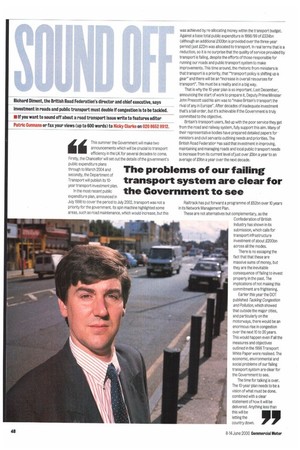di This summer the Government will make two
Page 50

If you've noticed an error in this article please click here to report it so we can fix it.
announcements which will be crucial to transport efficiency in the UK for several decades to come. Firstly, the Chancellor will set out the details of the government's public expenditure plans through to March 2004 and secondly, the Department of Transport will publish its 10year transport investment plan.
In the most recent public expenditure plan, announced in July 1998 to cover the period to July 2002, transport was not a priority for the government. its spin machine highlighted some areas, such as road maintenance, which would increase, but this
was achieved by re-allocating money within the transport budget. Against a base total public expenditure in 1998/99 of £334bn (although an additional £100bn is provided over the three-year period) just £22m was allocated to transport. In real terms that is a reduction, so it is no surprise that the quality of service provided by transport is falling, despite the efforts of those responsible for running our roads and public transport system to make improvements. This time around, the rhetoric from ministers is that transport is a priority, that —transport policy is shifting up a gear" and there will be an "increase in overall resources for transport". This must be a reality and in a big way.
That is why the 10-year plan is so important Last December, announcing the start of work to prepare it, Deputy Prime Minister John Prescott said his aim was to "make Britain's transport the rival of any in Europe". After decades of inadequate investment that's a tall order, but it's achievable if the Government is truly committed to the objective.
Britain's transport users, fed up with the poor service they get from the road and railway system, fully support this aim. Many of their representative bodies have prepared detailed papers for ministers and civil servants outlining needs and priorities. The British Road Federatior has said that investment in improving, maintaining and managing roads and local public transport needs to increase from its current level of just over £5bn a year to an average of 29bn a year over the next decade.
Railtrack has put forward a programme of g52bn over 10 years in its Network Management Flan.
These are not alternatives but complementary, as the Confederation of British Industry has shown in its submission, which calls for transport infrastructure investment of about £200bn across all the modes.
There is no escaping the fact that that these are massive sums of money, but they are the inevitable consequence of failing to invest properly in the past. The implications of not making this commitment are frightening.
Earlier this year the DOT published Tackling Congestion and Pollution, which showed that outside the major cities, and particularly on the motorways, there would be an enormous rise in congestion over the next10 to 20 years. This would happen even if all the measures and objectives outlined in the 1998 Transport White Paper were realised. The economic, environmental and social problems of our failing transport system are clear for the Government to see.
The time for talking is over. The 10-year plan needs to be a vision of what must be done, combined with a clear statement of how it will be delivered. Anything less than












































































































